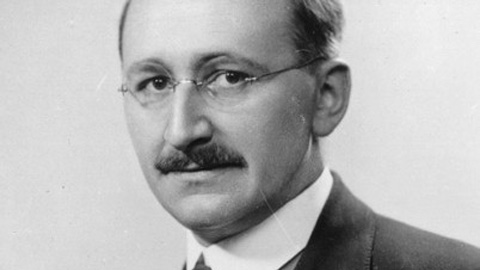King’s Hosts Distinguished Scholar of History of Economic Thought
King's recently hosted Dr. Bruce Caldwell, a leading expert on economist and philosopher F. A. Hayek.

On September 6, The King’s College hosted a lecture by Dr. Bruce Caldwell, the director of the Center for the History of Political Economy at Duke University and author of Hayek’s Challenge: An Intellectual Biography of F. A. Hayek. Caldwell edited the complete works of Hayek and is widely accepted as a leading expert on Hayek’s life and thought.
The lecture was the first event in a year-long series of lectures, symposia, and debates organized by Dr. Paul Mueller, assistant professor of economics at The King’s College. Throughout the year, King’s will host one senior scholar and two junior scholars per semester, and the emphasis will be on connecting these scholars with students and faculty in both formal and informal settings. Besides the speaker series, these grant-funded events will fund a student reading group and research hours for King’s faculty, among other things.
“Through the speaker series, this grant serves to connect our students to the broader world of economic theory and science, so they are exposed to economists at many different schools studying many different things, giving them some outside perspective,” says Mueller.
Caldwell specializes in the history of economic thought, which emphasizes how economic thought has developed over time and how economists in various periods of history interact with the challenges unique to their time. His talk began with a survey of Hayek’s life and work, including an in-depth look at early critiques of socialism. This served as background for a brief discussion of Hayek’s development of the theory of the knowledge problem, or Hayek’s observation that within a market, not all participants are making decisions with perfect knowledge. This observation prompted Hayek to ask why there is any coordination apparent within the market at all, and became the basis of his work on how prices work to organize economic activity in a market.
Caldwell also described Hayek’s concern during World War II that, even if socialism did not become the dominant economic philosophy in England and other Western nations, there was a general inclination towards giving the government more and more influence over the market. Hayek summarized his concerns about this government consolidation of the economy in his most famous book, The Road to Serfdom.
In the Q&A after the talk, students asked questions about Hayek’s shift from technical economics towards social and political questions; the relationship that Hayek’s last book The Fatal Conceit bears to the rest of his writings; and what steps Hayek may have proposed to help ease the 2008 economic crisis, had he been alive.
After the lecture, Caldwell joined economics faculty members and several top students for an informal lunch, and later in the day participated in a faculty colloquium about F.A. Hayek’s life and work. In the evening, The King’s College sponsored a symposium at the Pennsylvania Club where Caldwell and select faculty and staff, students, donors, and guests attended a dinner, where the conversation ranged from the relationship between economics and foreign policy to the dangers of intrusive regulation of the healthcare system.
Each of the visiting scholars will have a similar schedule. This set-up gives students opportunities to interact personally with top scholars and to hear, in both formal and informal settings, the most recent developments in the contemporary conversation about economic freedom.
In light of Caldwell’s visit and the robust conversations it sparked, Mueller expressed enthusiasm for the upcoming speakers. “One thing I am really excited about is that each of the speakers coming this year has the ability to engage students with a variety of interests, as they all tend to be very interdisciplinary,” he said. Because of this, Mueller is optimistic that even more students and faculty will participate in these events in the future.
On October 3, the College will host Dr. Greg Forster, who will speak on the question, “Can we have a common good without a common God?” On October 23, Dr. Shruti Rajagopalan will speak on, “Private Cities: What does development without government look like?” In the spring, the senior scholar will be Dr. David Schmidtz, who will speak on public reasoning, economics, and inquiries into justice in the marketplace.




